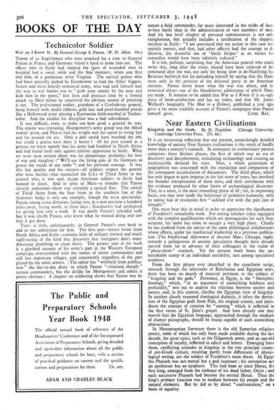BOOKS OF THE DAY
Technicolor •Soldier
War as I Knew It. By General George S. Patton. (W. H. Allen. 18s.) THOSE of us Englishmen who were attached for a time to General Patton in France and Germany found it hard to make him out. The officer who in Sicily had slapped the faces of wounded men in hospital had a sweet smile and the fine manners, when you first met him, of a gentleman from Virginia. The tactical genius who had been specially picked by Eisenhower to lead the Allies' biggest, fastest and most heavily-armoured army, who had said himself that the way to win battles was to "grab your enemy by the nose and kick him in the pants," lost lives and precious time by a frontal attack on Metz before he conceived the obvious notion of pinching it out. The professional soldier, grandson of a Confederate general, hung himself with medal ribbons, gold lace and pearl-handled pistols like a Hollywood actor playing a Ruritanian field-marshal in Techni- color. And the stickler for discipline was a bad subordinate.
It was difficult, even, to make out how good a general he was. The enemy was retreating, Montgomery's army group was the Allied armies' pivot, and Patton had the weight and the speed to swing fast and far around the arc. Only a dolt _could have botched the job, but could a genius have done it better ? Of his past record as a general we knew merely that his army had fumbled in North Africa and had found itself only against inferior opposition in Sicily. What we were soon certain about was his picturesque profanity, his love of war and slaughter (" We'll use the living guts of the Germans to grease the treads of our tanks ") and his personal courage. It was this last quality and his success—all soldiers respect the general who wins battles—that reconciled the G.I.s of Third Army to the general who, it was said, 50,000 American soldiers in Sicily had wanted to shoot. And in spite of Metz—a mistake that Patton cleverly redeemed—there was certainly a tactical flair. The switch of Third Army from the Saar front to the southern line of the Ardennes bulge is only one example, though the most spectacular. Patton swung seven divisions, facing east, to a new position a hundred miles away, facing north, in three days ; Eisenhower had apologised for giving him only a week. It was partly Patton's splendid staff, but it was chiefly Patton, who knew what he wanted doing and saw that it got done. There is little, unfortunately, in General Patton's own book to • add to our admiration for him. The first part—letters home from North Africa and Sicily—contains little of military interest and much
• sight-seeing of the kind that discovers that foreigners don't enjoy American plumbing or clean shirts. The greater part of the book is a glorified account of his army's part in the Western European campaign, overcrowded with the names of minor commanders and still less important villages, and consistently regardless of the part played by the other armies. (The editor has "withheld from publica- tion" the day-to-day diary in which Patton "criticised sharply" .- certain commanders, but the dislike for Montgomery and others is ..'pretty obvious.) A chapter on soldiering shows that Patton was by natum a field commander, far more interested in Me, tricks of, face- to-face battle than in the administration of vast numbers of men. And his last brief chapter of personal reminiscences is not only vainglorious, but actually includes a justification of the slapping incident in Sicily: "I am convinced that my action in this case was entirely correct, and that, had other officers had the courage to do likewise, the shameful use of 'battle fatigue' as an excuse for cowardice would have been infinitely reduced."
It is not, perhaps, surprising that the American general who could write this, long after the event, should have been relieved of his command after the war, not only for being slow in de-Nazifying his Bavarian bailiwick but for defending himself by saying that the Nazis were only in the .position of the defeated party in an American election. Patton never knew what the war was about, and he remained always one of the bloodthirsty adolescents of which Nazis are made. It remains to be added that War as I Knew It is an ugly piece of book-production and has no index, and that Mr. James Wellard's biography The Man in a Helmet, published a year ago, gives a far more readable account of Patton's campaigns than Patton


































 Previous page
Previous page